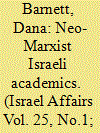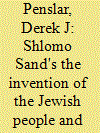| Srl | Item |
| 1 |
ID:
164325


|
|
|
|
|
| Summary/Abstract |
This article reviews the writings of post-Zionist, neo-Marxist Israeli academics, and the way they have contributed to blurring the line between legitimate criticism of Israeli policies and actions and classical and/or new forms of anti-Semitism. By way of doing so, it will describe the paradigmatic shift in the social sciences and humanities that has given rise to the phenomenon of academic anti-Semitism; analyse the writings of neo-Marxist Israeli scholars with an emphasis on anti-Semitic themes in their writings; and look at the extra-mural criticisms made by Israeli academics and the unwillingness of many universities to confront them.
|
|
|
|
|
|
|
|
|
|
|
|
|
|
|
|
| 2 |
ID:
103723


|
|
|
|
|
| Publication |
2011.
|
| Summary/Abstract |
The major historical issue in the Israeli-Arab/Palestinian conflict is the causes for the 1948 Palestinian exodus. Among the Israelis/Jews there are two main narratives regarding this issue: the Zionist one - the refugees fled, for various reasons; and the critical one - some fled while others were expelled by the Jewish/Israeli security forces. This article explores the way the Israeli/Jewish historical memory (i.e. the Israeli/Jewish research community) related to this historical issue from 1949 until 2004. According to the findings, until 1957 this memory exclusively presented the Zionist narrative. However, from 1958 to 1976 this Zionist trend largely continued but was accompanied by considerable critical studies. Later, from 1977 to 2004, this memory was characterized by the almost exclusive adoption of the critical narrative (with major increase in its significance since 1988). These findings contradict the way the literature relates to this memory as almost exclusively Zionist until the late-1980s. Other aspects of this memory are also discussed, such as the explanations for its characteristics, the significance of non-academic scholars, the contribution of scholars who reside externally to the given country, state-research community relations, the influence of present interests on the portrayal of the past, and gender issues. The findings have theoretical implications for collective and historical memories.
|
|
|
|
|
|
|
|
|
|
|
|
|
|
|
|
| 3 |
ID:
112540


|
|
|
|
|
| Publication |
2012.
|
| Summary/Abstract |
Israel's "New History" has itself become history. What in the late 1980s and 1990s appeared to be shocking revelations about Israeli policy in 1948 have become anodyne. In Israeli academia, many of the New Historians' arguments have become mainstream, as they have been debated, examined, and found to be by and large accurate. What is more, the New Historians' findings now spur little controversy in Israeli society as a whole. Some Israelis outside of academia have developed a more critical approach to their country's past, but many more have responded to the nearly constant Israeli-Arab strife of the past decade by forming a jaundiced view of the country's historical record and justifying Israeli aggression and brutality as unfortunate but necessary measures in an endless war against an unappeasable foe. Thus recent revisionist accounts of the 1967 war have received far less press and been far less controversial than their predecessors on 1948 and 1956. So what, Israelis may ask, if, as Tom Segev's massive tome on 1967 argues, Israel hankered for war in order to pull the country out of the funk induced by the 1966 recession?1
|
|
|
|
|
|
|
|
|
|
|
|
|
|
|
|